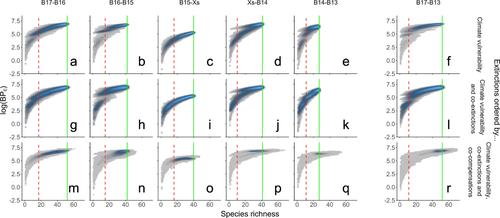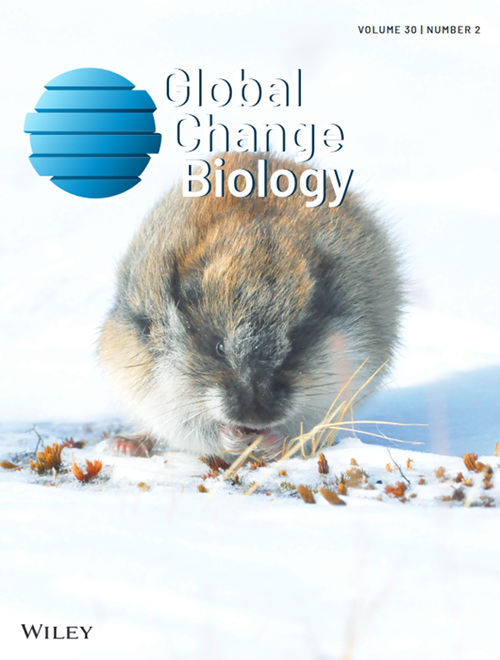共同灭绝和共同补偿物种对气候变化适度生态系统未来的响应
IF 12
1区 环境科学与生态学
Q1 BIODIVERSITY CONSERVATION
引用次数: 0
摘要
人们已经达成共识,生物多样性的连续丧失导致生态系统特性的非线性和加速下降。然而,这种关系的形式是基于理论和经验得出的观察,不包括物种共同灭绝。在这里,我们使用来自海洋底栖无脊椎动物群落的数据来参数化基于特征的灭绝模型,该模型通过包括气候驱动的环境变化梯度中不同物种之间的依赖关系来调整物种灭绝和补偿的概率。我们的模拟表明,与单个物种的连续消失相比,静态共同灭绝导致沉积物生物扰动轨迹的明显下降——这是一个对海洋生态系统功能非常重要的过程。补偿机制和对来自本地和区域物种池的新相互作用形成的允许,缓和了共同灭绝的复合影响,但在群落响应中引入了额外的可变性,这取决于进入和退出物种的组成和功能作用。我们的观察强调了考虑本地和区域群落动态的重要性,特别是在高度连接的系统中,当预测生物多样性改变的生态系统后果时,容易发生灭绝级联。本文章由计算机程序翻译,如有差异,请以英文原文为准。

Co-Extinctions and Co-Compensatory Species Responses to Climate Change Moderate Ecosystem Futures
Consensus has been reached that the sequential loss of biodiversity leads to a non-linear and accelerating decline in ecosystem properties. The form of this relationship, however, is based on theory and empirically derived observations that do not include species co-extinctions. Here, we use data from marine benthic invertebrate communities to parameterise trait-based extinction models that adjust the probability of species extirpation and compensation by including the dependencies between different species across a gradient of climate-driven environmental change. Our simulations reveal that the inclusion of static co-extinctions leads to more pronounced declines in the trajectories of sediment bioturbation—a process of great importance to the functioning of marine ecosystems—than those observed with sequential losses of single species. Compensatory mechanisms and the allowance of the formation of new interactions derived from local and regional species pools moderate the compounding influence of co-extinction but introduce additional variability in community response depending on the composition and functional role of incoming and outgoing species. Our observations emphasise the importance of accounting for local and regional community dynamics, especially in highly connected systems that are prone to extinction cascades when projecting the ecosystem consequences of altered biodiversity.
求助全文
通过发布文献求助,成功后即可免费获取论文全文。
去求助
来源期刊

Global Change Biology
环境科学-环境科学
CiteScore
21.50
自引率
5.20%
发文量
497
审稿时长
3.3 months
期刊介绍:
Global Change Biology is an environmental change journal committed to shaping the future and addressing the world's most pressing challenges, including sustainability, climate change, environmental protection, food and water safety, and global health.
Dedicated to fostering a profound understanding of the impacts of global change on biological systems and offering innovative solutions, the journal publishes a diverse range of content, including primary research articles, technical advances, research reviews, reports, opinions, perspectives, commentaries, and letters. Starting with the 2024 volume, Global Change Biology will transition to an online-only format, enhancing accessibility and contributing to the evolution of scholarly communication.
 求助内容:
求助内容: 应助结果提醒方式:
应助结果提醒方式:


